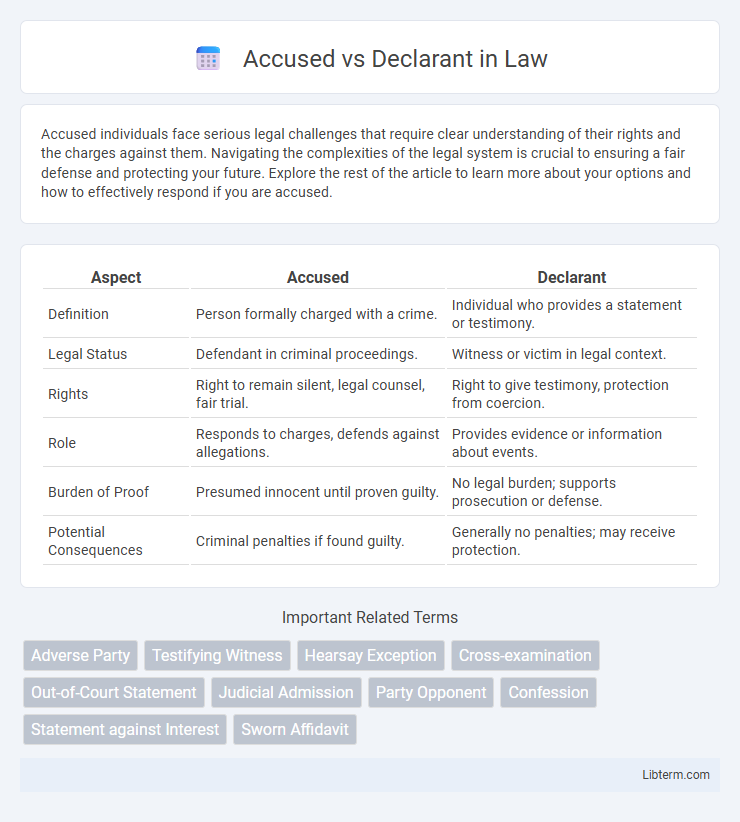Accused individuals face serious legal challenges that require clear understanding of their rights and the charges against them. Navigating the complexities of the legal system is crucial to ensuring a fair defense and protecting your future. Explore the rest of the article to learn more about your options and how to effectively respond if you are accused.
Table of Comparison
| Aspect | Accused | Declarant |
|---|---|---|
| Definition | Person formally charged with a crime. | Individual who provides a statement or testimony. |
| Legal Status | Defendant in criminal proceedings. | Witness or victim in legal context. |
| Rights | Right to remain silent, legal counsel, fair trial. | Right to give testimony, protection from coercion. |
| Role | Responds to charges, defends against allegations. | Provides evidence or information about events. |
| Burden of Proof | Presumed innocent until proven guilty. | No legal burden; supports prosecution or defense. |
| Potential Consequences | Criminal penalties if found guilty. | Generally no penalties; may receive protection. |
Introduction to Accused and Declarant
The accused refers to an individual formally charged with a crime, facing legal allegations and subject to trial proceedings. The declarant is a person who makes a statement or declaration, often serving as a witness or providing testimony in legal contexts. Understanding the distinct roles of accused and declarant is crucial for evaluating evidence and ensuring procedural fairness in judicial processes.
Definitions: Accused vs Declarant
The accused refers to an individual formally charged with a crime or offense in a legal proceeding, who faces allegations and must defend against prosecution. The declarant is a person who makes a statement or declaration, often providing testimony or evidence, but is not necessarily charged with any wrongdoing. Understanding the distinction between the accused, who is subject to legal sanction, and the declarant, who serves as a source of information, is essential in criminal law and courtroom procedures.
Legal Roles in Court Proceedings
The accused is the individual charged with a criminal offense and has the right to defend themselves against the charges in court. The declarant is a person who provides a statement or testimony, often as a witness, which can be used as evidence during legal proceedings. Understanding the distinct legal roles clarifies the accused's right to due process and the declarant's role in presenting factual information to support the case.
Rights of the Accused
The rights of the accused include the presumption of innocence, the right to remain silent, and protection against self-incrimination during legal proceedings. Unlike a declarant, whose statements may be admissible as evidence, the accused has the constitutional right to confront witnesses and challenge evidence presented against them. Ensuring due process safeguards the accused's right to a fair trial and prevents wrongful conviction based on uncorroborated declarations.
Statements Made by the Declarant
Statements made by the declarant are critical in distinguishing the roles of accused versus declarant in legal proceedings. These statements, often documented as testimonies or affidavits, serve as evidence reflecting the declarant's perspective and can significantly influence the outcome of a case. Courts carefully analyze the declarant's statements for consistency, credibility, and relevance to establish facts and assess the accused's responsibility.
Evidentiary Value: Accused vs Declarant Testimony
The evidentiary value of accused testimony often carries significant weight due to the right against self-incrimination, requiring corroborative evidence for conviction. Declarant testimony, particularly hearsay statements, faces stricter admissibility rules and is generally considered less reliable unless falling under recognized exceptions such as spontaneous statements or excited utterances. Courts assess the credibility, context, and voluntary nature of both accused and declarant statements to determine their probative value in legal proceedings.
Hearsay Rule and Declarant Statements
The hearsay rule generally excludes out-of-court statements offered to prove the truth of the matter asserted, with exceptions for declarant statements under certain conditions such as excitement, prior inconsistent statements, or declarations against interest. An accused's statements may be admissible as party admissions, whereas declarant statements require careful scrutiny to determine reliability and applicability of hearsay exceptions. Understanding the distinction impacts evidentiary rulings, as declarant statements must often meet specific criteria to overcome hearsay objections while accused statements can be used directly against them.
Impact on Criminal Trials
The distinction between accused and declarant significantly impacts criminal trials by shaping the evaluation of evidence and witness credibility. Accused individuals have the right to confront and cross-examine declarants, ensuring procedural fairness and safeguarding the accused's defense. Courts weigh the reliability of declarant statements against the accused's testimony, influencing verdict outcomes and trial integrity.
Case Law Distinguishing Accused and Declarant
Case law distinguishes between the accused, who is the individual facing criminal charges, and the declarant, who is the person providing a statement or testimony often used as evidence. Jurisdictions consistently emphasize that the accused's rights to confrontation prevent the admissibility of out-of-court statements by declarants unless specific exceptions apply, such as hearsay exceptions defined in rules like Federal Rule of Evidence 803. Landmark rulings, including Crawford v. Washington, highlight that testimonial statements by declarants require the accused's opportunity for cross-examination to ensure fairness and constitutional due process.
Conclusion: Navigating Key Differences
Understanding the key differences between an accused and a declarant is essential for legal clarity and case outcomes. The accused is the individual formally charged with a crime, whose rights and defenses are protected throughout the judicial process. The declarant, however, is the person who provides a statement or testimony, which may serve as critical evidence but does not carry the same legal status or protections as the accused.
Accused Infographic

 libterm.com
libterm.com